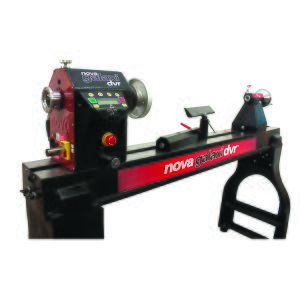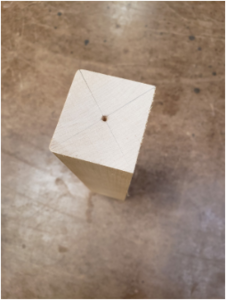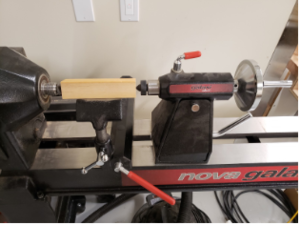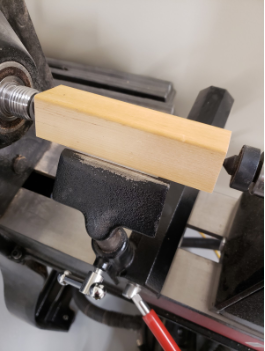Difference between revisions of "Wood Lathe"
(→Safety) |
(→Safety) |
||
| Line 68: | Line 68: | ||
# Use the gouge to slowly begin chipping away the wood. Make sure the chisel to pressed firmly into the tool rest and you are holding the bottom of the handle tight into your core. | # Use the gouge to slowly begin chipping away the wood. Make sure the chisel to pressed firmly into the tool rest and you are holding the bottom of the handle tight into your core. | ||
# Slowly push the chisel up until it begins chipping at the wood. | # Slowly push the chisel up until it begins chipping at the wood. | ||
| − | # Start | + | # Start with the high parts of the piece or towards the middle if it’s all even, and move the chisel towards the end, chipping away little bits of wood at a time. |
# Smooth out the wood, chipping away until you make a cylinder. | # Smooth out the wood, chipping away until you make a cylinder. | ||
# Once you have the cylinder, choose one side to be the head. | # Once you have the cylinder, choose one side to be the head. | ||
Revision as of 10:19, 15 August 2019
Make: TeknaTool
Model: Nova Galaxi DVR
Ace: Needed (Makerhub@georgefox.edu).
Location: Wood Shop
Description
The wood lathe is a machine very similar to the metal lathe in the machine shop. It spins a piece of stock at a variable speed, and lets the turner create round objects. Unlike the metal lathe, there is not a cutter secured to the machine that is moved into place to cut. On the wood lathe, a turner will instead use long handled chisels to carve away the wood. Another difference is that for most projects, the wood is not clamped down in a found vise like the machining lathe, instead, two free-spinning center points on each side of the piece clamp the wood between them and hold it centered.
There are a wide variety of projects that can be done on the wood lathe, some easier than others, and all requiring a different need for skills and tools. This makes it hard sometimes to provide a common set of instructions, however, there some general safety rules and instructions for use that are used in any project on the lathe. The lathe can be fun to work with, but always remember, safety first.
Documentation
Terminology
Spindle: The spinning part
Chisel: The cutting tool
Tool Rest: The bar to help hold the tool in place
Training
Overview
The wood lathe is a machine very similar to the metal lathe in the machine shop. It spins a piece of stock at a variable speed, and lets the turner create round objects. Unlike the metal lathe, there is not a cutter secured to the machine that is moved into place to cut. On the wood lathe, a turner will instead use long handled chisels to carve away the wood. Another difference is that for most projects, the wood is not clamped down in a found vise like the machining lathe, instead, two free-spinning center points on each side of the piece clamp the wood between them and hold it centered.
Demonstration
You're going to make a snowman out of some wood! The goal is to smooth it into 3 spheres that look like a snowman, no additional accessories like carrot noses and top hats are necessary.
General Procedure
- Get your stock at whatever size you need for your project, and make it square stock so that all sides are the same size.
- Mark the center of both ends and use a punch to indent on the middle of both ends. This helps the lathe to spin it at its center.
- Make sure to use the two point centers on the lathe and ensure the motor head is tight on the rails. It would be very unfortunate to have your piece fly off.
- Move the end head to a distance longer than your stock and place one end of the stock on the motor head center, lining up the punch hole with the center point.
- Spin the handle on the back of the end head until the other center lines up with the punch hole on the other side of your stock.
- Rotate the handle and extra couple turns to push the stock into the motor head center and turn the red handle to hold the spindle in place. Now your piece is secured!
- Turn on the machine with the red switch on the side of the motor head. It will start to spin
- The metal tool rest should be at a height so that the tool on top of the rest will be cutting at the middle of the stock.
- The tool rest should be placed as close to the stock as possible where the stock can still spin freely without hitting the tool rest.
- Start the spindle at about 750 rpm.
- Use the gouge to slowly begin chipping away the wood. Make sure the chisel to pressed firmly into the tool rest and you are holding the bottom of the handle tight into your core.
- Slowly push the chisel up until it begins chipping at the wood.
- Start with the high parts of the piece or towards the middle if it’s all even, and move the chisel towards the end, chipping away little bits of wood at a time.
- Smooth out the wood, chipping away until you make a cylinder.
- Once you have the cylinder, choose one side to be the head.
- Gradually narrow down to a cone shape, then cut away material to make the three spheres of the snowman’s body.
- After the shape is done, sand the piece, progressively finer grit until smooth.
- Take the piece off, cut any remaining material and sand the mount points smooth.
- Yay, done. Reset the space.
Safety
Do not wear anything that could possibly get caught in the lathe, like bracelets, lanyards, hair below the shoulders, etc. We'd rather you not spin at 750 rpm.
When in doubt, ask someone what to do. The shop supervisors are skilled and are glad to give advice. Additionally, no one wants to deal with anyone getting hurt, so lets do everything we can to prevent that.
The most common issue with safety is digging the chisel in too hard. If it is dug in too hard, it can get caught in the wood and get shot across the shop. This is another instance we would love to avoid, but learning what is considered "too hard" comes from practice. Asking a shop supervisor to watch you and tell you how much pressure is good enough is a great route to go.
Certification
Foxtale Quiz
Troubleshooting
If the lathe is sounding funny, tell the shop volunteer/supervisor so we can get that checked out.
If you feel like you're losing grip on the chisel while shaving it down, chances are that you are digging in too hard. Lighten up a little, and be patient.
If it doesn't seem to be cutting well, first check the tool's sharpness before digging in deeper. If the tool is not sharp, notify the shop volunteer/supervisor and grab another chisel that is sharp.
Maintenance
General maintenance
The wood lathe has few items that need to be maintained by the student or the Ace. Refer to the table below to see each procedure, how often it should occur, and the the last completion of the specific task.
Specific Maintenance Tasks
| Maintenance Procedure | Frequency | Done By |
|---|---|---|
| General Cleaning, vacuum shavings and dust | Before and after each use | Student |
| Check tightness of bolts, lubricate with 1 or 2 drops of lightweight oil on tailstock quill threads, index pin, and Toolslide camshaft and Toolslide front camshaft bore | Monthly | Ace |
| Lubricate tailstock Slot with 1 or 2 drops of lightweight oil | Every 6 Months | Ace |




